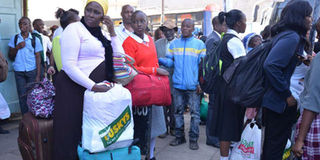Campaigns, new curriculum usher in second term

Back to school: Parents and students wait for transport at Tea Room bus stop on Accra Road in Nairobi on January 4, 2017. Schools will have to conduct co-curricular activities in the second term. PHOTO | SALATON NJAU | NATION MEDIA GROUP
What you need to know:
- Kenya National Union of Teachers secretary-general Wilson Sossion said teachers are ready for the new term.
- The CS warned heads of schools and board members against misuse of funds.
Schools re-open for the second term on Tuesday with several activities lined up during the period amid heightened political campaigns ahead of the August elections.
Top on the academic calendar this term will be the piloting of the new curriculum and the release of the report on school arson attacks last year.
Learners will also have to contend with increased political activities, which are likely to interfere with learning in some areas.
Education Cabinet Secretary Fred Matiang’i asked the Independent Electoral and Boundaries Commission (IEBC) to rein in politicians who destroy school facilities during campaigns.
PROPERTY DAMAGE
Dr Matiang’i said he had provided several public schools as designated polling centres throughout the country and taken all steps to ensure efficient access to these institutions by candidates and eligible voters.
“It has, however, come to our notice that the property of several public schools has been severely damaged during the political party primaries.
"These actions are illegal and will certainly upset school operations including opening of schools, which begin next week,” the CS said in a letter to IEBC chairman Wafula Chebukati dated April 26.
He went on: “Noting your pivotal role in the country’s electoral process, I request you to use your good offices to remedy this worrying situation.”
FUNDS AVAILABLE
Schools will also have to conduct co-curricular activities, prayer days, visiting, prize-giving ceremonies and Annual General Meetings this term since such activities are prohibited in third term.
Already the government has released Sh3 billion to secondary schools ahead of the re-opening in order to allow schools to run effectively.
The government will also be embarking on piloting of the new curriculum in 470 selected schools ahead of its rollout in January next year.
The piloting will be from pre-primary to Grade Three.
Five pre-primary and five primary schools from each county have been selected for the exercise that will end in August.
The new system has three tiers: early years comprising Pre-Primary One to Grade Three; middle-school, comprising Grades Four to Nine; and senior school, running from Grade 10 to 12.
INDISCIPLINE CASES
The new education framework will focus more on Continuous Assessment Tests (CATs) and will see the current classification replaced with grading, according to Kenya Institute of Curriculum Development.
Kenya Secondary School Heads Association chairman Kahi Indimuli, who spoke at the forum, appealed to principals to be extra vigilant this term and act on any intelligence.
“We have asked our members to be regular in schools, and have constant consultations with students so that we can have a peaceful term,” Mr Indimuli said.
He also asked school heads to stick to the school fees guidelines issued by the ministry and, in case of any increase, seek the approval of the Cabinet Secretary.
BULLYING
National Parents Association chairman Nicholas Maiyo asked school heads to create an education environment for learners free from bullying of learners.
He said the association would not accept a situation where prefects are given power to inflict physical, psychological or emotion harm on fellow students for whatever reason.
Mr Maiyo said parents entrusted their children in the hands of the school administration in the hope that they will be accorded a friendly environment to learn.
Kenya National Union of Teachers secretary-general Wilson Sossion said teachers are ready for the new term.
BUILDING CLASSES
Speaking at a workshop for principals of secondary schools and chairpersons of boards of management at Nakuru Girls’ High School, Dr Matiang’i said the government had set aside Sh6 billion to finance construction of 2,000 additional classrooms in 2,576 secondary schools across the country in order to absorb 1.2 million additional students.
“The funds will also be used to construct 1,000 laboratories and a further 1,000 sanitation facilities to cater for two classes each in the schools,” he said.
It is estimated that each classroom will cost Sh1 million, laboratory will cost Sh3 million while an ablution block will cost Sh500,000.
“In order to meet the staffing needs of the extra spaces created, a projection is made on the basis of staffing norms of schools where a one stream school of 180 students is entitled to nine teachers,” the report by the Ministry of Education states.
PROSECUTION
The growth in Kenya Certificate of Primary Education (KCPE) examination enrolment has not had a commensurate growth in secondary schools.
The report further indicates that inadequate secondary school places has been the greatest contributor of poor transition from primary to secondary and proposes that parents make their contributions as well as constituency development funds in construction of more classes.
The CS warned heads of schools and board members that they will be arrested and prosecuted should they misuse the funds as they had a shared responsibility in the school finance.
“Principals and board members should not allow themselves to be influenced by MPs on how to spend infrastructure funds the government has given to them,” said Dr Matiang’i.





